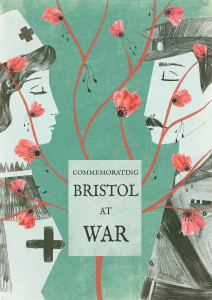The Public Lecture Series at Bristol Library 1941-1943

Share this
Bristol Central Library holds a fascinating collection of leaflets that were produced to promote a series of public lectures held between 1941 and 1943 as part of a tour organised and paid for by the Ministry of Information. One of the Ministry's roles was, ‘To promote the national case to the public at home and abroad in time of war’.
The leaflets include speaker biographies and bibliographies of suggested reading with the recommendation that people ask for the books listed at their local library. Local history librarian Dawn Dyer believes that many of the books dating from the war in the library’s reserve stack were bought to coincide with the lectures.
In addition to the leaflets, the collection includes press-clippings from the Bristol Evening Post, Western Daily Press and Bristol Evening World.
The series included:
‘The Diplomatic Background of the War’ by Harold Nicholson MP. A report in the Press said that Nicholson believed that Germany viewed diplomacy as war by any other name. He said the Allies should be magnanimous in victory, though they must not give way to sentimentality. His comments prompted letters of complaint in the Post about needing more than ‘soothing syrup’ at this time, and the World‘s ‘Bristol Born’ opinion column stated that Britain must never again treat Germany with magnanimity.
‘The War of Survival’ by Leslie Burgh MP (a member of the Brains Trust). Audience members were said to have hissed when Burgh was asked whether he agreed that if the Allies had been more generous to Germany after the First World War and given back her colonies there would not have been another conflict.
‘Why We Fight’ by Kenneth WM Pickthorn MP, who believed it was better to say we are fighting for King and country than for our lives. The following year in the lecture What is at Stake?, J J Craik Henderson believed that we were fighting for our lives and all we held dear.
‘Why Democracy Failed in the Continent’ by Karl Effer, an Austrian refugee who claimed that Hitler had been elected by those who didn’t vote.
‘The Campaign in Libya’ by Richard Dimbleby, who had recently returned to Britain from the war zone. In an interview in the Press, Dimbleby excluded Bristol from his accusation that there was more careless talk in Britain than in Cairo, a notorious hot-bed of espionage. An item in the Post after the event refers to him hearing troops overseas blessing the name of Bristol because of the effectiveness of the Bristol Blenheim bomber.
‘Art in Wartime’ by J E Barton. A former head of Bristol Grammar School, Barton said the government believed art was inseparable from freedom and not a luxury or a superior pastime. He included film as a modern art form, and encouraged exhibitions on re-planning bombed cities and on architecture.
‘Science in Wartime’ by Lionel J F Brimble (editor of Nature). This lecture was in response to the recent call by the Scientists Parliament that the public should be more science-minded. Brimble spoke of the voluntary register of scientific specialists which had been created before the war in anticipation of a conflict in which scientific expertise would be key. The register was eventually taken over by the Minister of Labour. In its coverage, the Post referred to the work of the team of scientists at University of Bristol who were contributing to the war effort.
‘The Merchant Navy Goes to War’ by Jack Strother. Members of the Bristol Shiplovers Society were in the audience. Strother gave an account of attacks by the Japanese on merchant ships carrying refugees from Singapore. The next day’s papers reported that, ‘Rarely has a more moving story of the sea been told in Bristol’ and that, ‘This was a story that should be told in the factories and workshops throughout the country, in the mines and in the cinemas.’
There were also lectures on the war in relation to Poland, Czechoslovakia, Free France, Yugoslavia (delivered by Rebecca West), France, The Netherlands, Belgium, India, Australia, South Africa, Canada, Russia, China (part of China Week marking the 5th anniversary of the declaration of a state of war between China and Japan), the Far East, the Colonial Empire, and the Mediterranean. There were lectures on mechanised warfare, the war in the air and sea power, and three on aspects of the war in relation to the USA.
The folder which contains information on the series also includes clippings from the Library Association Record from 1942 and 1943 which refer to the many other information pamphlets and reading lists produced by the library service during the war. Bristol’s reading habits during this period are the topic of a one-sheet article entitled, ‘What Bristolians are reading in war time’ by James Ross, the City Librarian. This was published by the Bristol Chamber of Commerce in 1940. Ross reported heavy demand for books on mechanical and technical subjects, with those engaged in war work borrowing books relating to their jobs. The library had produced special readings lists on gardening, cookery and food to help readers; the material available included publications from the Ministry of Food and Agriculture. There had been a revival of interest in ‘masterpieces of our national literature’ and an increased demand for music ‘which may be due in part to the stimulus of BBC concerts in our midst’.
The only book referred to by name was Hitler’s Mein Kampf, for which there were long waiting lists ‘in spite of the large number of copies of this work in circulation’.
Notes
The items relating to the lecture series are ref RR 275 BID272. The article on wartime reading is ref B16240.

